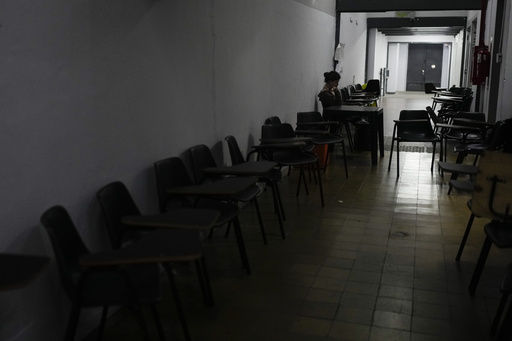
BUENOS AIRES, Argentina — Adrenaline coursed through the veins of Argentine students as they rushed into oncoming traffic, dominating lanes and halting trucks and motorbikes in their tracks. Some irritated drivers reacted with rude gestures and shouts, while others exhibited support for the demonstrators chanting, “Public and free education!” They were protesting against President Javier Milei’s budget cuts to universities, shifting from fear to exhilaration as they voiced their discontent.
Architecture student Ivan Rocha emphasized the cause behind their actions, stating, “We’re here for our teachers, to demand that they get decent salaries,” as the noise of the protest surged with honking and chants. These confrontations were part of ongoing protests expected to escalate throughout Argentina this month in response to Milei’s recent veto of a law aimed at increasing funding for public universities. Meanwhile, many educators initiated a two-day strike to exhibit their disapproval.
Milei’s administration, having persuaded centrist lawmakers to withdraw support for a proposed teacher salary increase intended to counteract Argentina’s soaring inflation, upheld the veto in the Senate earlier this month. The proposed funding increase was projected to cost only 0.14% of the country’s gross domestic product, highlighting the political dynamics at play. “This was a pivotal moment for Milei to show he could maintain a presidential veto,” remarked Ignacio Labaqui, a senior analyst at a risk consulting firm in Buenos Aires. “It represents more than just an economic decision.”
Self-identified as an “anarcho-capitalist,” President Milei, who ascended to office in November 2023 with promises to rein in years of excessive spending, has committed to veto any measures that could threaten his commitment to a zero-deficit policy. Post-veto, he criticized public universities for being “hotbeds of leftist radicals” and for excessive administrative costs. Additionally, the government has commenced an audit of financial allocations within the University of Buenos Aires (UBA).
With many universities facing chronic overcrowding and financial constraints, especially after experiencing a 30% budget cut during Milei’s administration, the veto has been perceived as an imminent threat to the nation’s cherished system of free tuition and open admissions—critical elements for middle-class advancement. UBA rector Ricardo Gelpi voiced concern, declaring, “We are at an unprecedented juncture in our democratic history, and if this trend continues, we risk reaching a point of no return.”
Throughout early October, tens of thousands took to the streets, protesting from the gates of Congress to distant valleys. Eager to defend a system that they view as vital to their futures, 24-year-old education student Ivan Fleming remarked, “It’s a fundamental right that I grew up with. My aspiration to become a teacher feels threatened.”
During the protests, many educators transformed the streets of Buenos Aires into makeshift classrooms, delivering lectures amid the chaos as vehicles honked in response. Plans for a significant “teach-in” at Plaza de Mayo, the central government square, are set for Tuesday, demanding that teacher salaries align with inflation, which has skyrocketed over 290% earlier this year.
As young activists lead the charge, 22-year-old protester Micaela Fioresta stated, “Students are at the forefront of this movement, and if we succeed, it will inspire workers and others struggling for fair wages.” This emerging unity aims to apply mounting pressure on Milei, who is striving to avoid further unrest.
Reflecting on previous protests, April marked one of the most significant confrontations of Milei’s presidency, as a massive rally against education budget cuts brought together an unusually broad segment of the Argentine population. “After experiencing the repercussions in April, one might expect him to hesitate in reigniting this conflict,” noted Marcelo J. García from a New York-based geopolitical consultancy.
Under pressure from the public last April, Milei had to increase funding just enough to ensure that universities could maintain basic operations. However, this adjustment did not address the already meager salaries of educators, which have plummeted by 24% between November 2023 and August 2024, as reported by university union representatives.
The recent economic turmoil, exacerbated by Milei’s policies, has pushed an estimated additional 5.5 million individuals into poverty over the past six months. According to the national council of universities, over 70% of teachers now earn salaries that fall below the official poverty threshold. In a bid to rectify the situation, the government proposed a meager 6.8% salary increase for teachers, while union representatives demanded a far more substantial 63.5%.
Faced with the prospect of mass resignations, universities are sounding alarm bells as instructors consider leveraging their skills in private education settings. The University of Quilmes recently announced the suspension of course enrollment due to critical shortages of resources.
“This is an unprecedented situation in terms of cutbacks we’ve seen,” commented Ana Rusconi, a sociologist who teaches at the University of La Plata while also managing to teach high school due to her low professor’s salary of $200 per month. “The protests have shifted focus from progressing forward to reclaiming what the administration has taken from us.”
